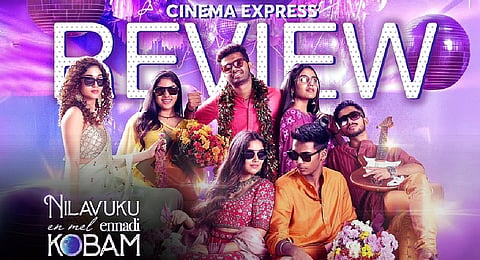

Centuries of storytelling and the human race have always been enamoured by love. So, when Dhanush chose to call his third directorial a ‘usual love story’, it also reads as a playful reminder of the power of romance to reach beyond the bounds of familiarity and still tug at our hearts. However, Nilavuku En Mel Ennadi Kobam battles more than just familiarity, there are multiple issues that threaten to pull you away.
The unidimensional performances, stale humour, plot conveniences, over-reliance on Gen Z lingo. And yet, towards the end, when the story crescendos to a point where the lovers yearn for each other and we are not sure if they will ever get together, genetic memory kicks in and you cannot help but root for love itself to win.
A young chef named Prabhu and his extremely wealthy girlfriend Nila turn into sour exes and the boy decides to attend his exes’ wedding in search of closure.
This coming-of-age romance has plenty of romantic moments that work in isolation but not in a way that shows how the characters evolve, change or learn anything new about themselves or their approach to love. While this is not a hard rule to follow in a romantic story, it could have definitely helped bridge our emotional distance from the characters.
Much of the film’s energy and vigour comes from a list of colourful supporting characters who thankfully do not exist merely to hype up the leads. The characters of Prabhu and Nila are designed in a way that their personalities charmingly dovetail with each other: Prabhu is a passionate chef while Nila is a passionate foodie.
While the characters are strongly built, the string that connects them together - the dialogues - feels strangely thin. Every character talks in a unidimensional rhythm and poise, exhibiting a similar pattern of thinking. For example, when Nila’s father (played by a severely underutilised Sarathkumar) goes on a tirade elaborating why he disapproves of their union, Prabhu stops him, puts on his sunglasses and calmly replies “I don’t care”.
What should have been a ‘mass’ moment fizzles out because the line is neither clever nor powerful. It feels like the writer scribbled out Prabhu’s primary thought in the first draft but failed to flesh it out beyond that. The dialogues also come across as if they are born from the mind of the writer and not the characters, with the individual personalities of the characters not infused within the lines.
This issue of unidimensionality extends to the performance as well, with every actor exhibiting a shade of Dhanush himself. However, the director leaves his signature in agreeable ways as well, with his flair for strong aesthetic sense. NEEK might be one of the most visually pleasing Tamil films in recent memory. Whether it is a vibrant wedding, a terrace, or a small beachside campfire for cooking, the staging and lighting are tastefully done. However, Dhanush’s overreliance on rain to punctuate intense, emotional moments, overstays its welcome after a point.
This coming-of-age romantic comedy has plenty of charming moments, and a vibrant cast, and its effort to fit contemporary sensibilities into the everlasting allure of love stories is certainly commendable. Unfortunately, it takes a long while for you to emotionally engage with the characters and their plight.
Apart from Prabhu and Nila, there are several other inter-connecting romantic subplots. In the beginning, this strengthens the drama and adds depth to the characters.
However, the inter-connecting threads become overbearing towards the end, and the final tease for a sequel confirms your suspicion that Dhanush, in his attempt to add complexity to a regular love story, has gotten himself entangled in the multiple story threads and has now written himself into a corner.
They say love is blind and this might be true in the case of love stories as well. You remain disengaged for a major portion of the film, but when Prabhu writhes in pain like a child after seeing the love of his life getting married, you cannot help but hope it all somehow works out for them in the end. While everything else might have worked against the film, its heart- a simple, ‘usual love story’, is ironically what makes you forget every issue you had with the film until that point. Funny how that works…